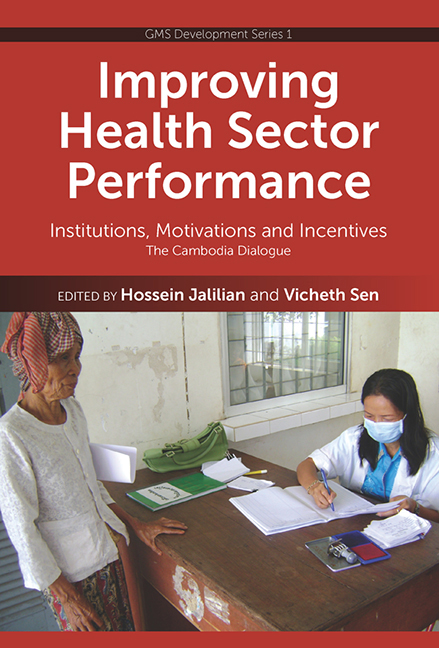 Improving Health Sector Performance
Improving Health Sector Performance from APPENDIX
Published online by Cambridge University Press: 21 October 2015
INTRODUCTION
Cambodia has been experimenting with health equity funds (HEFs) for almost a decade. University Research Co., LLC (URC) has been supporting the implementation of HEFs since 2003 as part of the “Health Systems Strengthening in Cambodia” (USAID-HSSC 2002–08) and the “Better Health Services” (URC-BHS 2009–13) projects funded by USAID. HEFs are a pro-poor health financing scheme, operated by national NGOs, which identify the poor households in an area and then provide financial support to those poor in procuring public health services. This is done by purchasing health services on behalf of these poor, providing them with reimbursements for transport to health facilities, and providing the patients’ caretakers with money to cover food expenses.
Since their first introduction, the number of HEFs has increased significantly. Figure A.1 illustrates this growth, showing that of the thirty-two HEF schemes in place by 2007, half are two years old or less. Some HEF schemes have not run continuously since implementation and several schemes have changed donors. For simplicity, colours represent current donor and breaks are not shown.
HEF schemes are popular with many stakeholders. Almost all poor people using the scheme report that they appreciate the assistance and say they would use the same service again in the future (MoH Monitoring Group Reports 2007 and 2008). Moreover, many public health service providers welcome the HEF scheme in their facility because it generates regular income for their facility and staff.
Cambodia's public health system is managed by the Ministry of Health, with authority delegated to twenty-four provincial and municipal health departments (PHDs), which are further divided into seventy-six operational districts (ODs). Each of these ODs operates public health centres and most manage a district referral hospital. The PHD manages a provincial referral hospital and the central MoH manages tertiary national referral hospitals.
Cambodia's public health service is underutilized. Those who can afford to frequently use private services, while the poor, who in many cases would like to use public health services, are prevented by a variety of barriers. HEFs are meant to help remove the barriers so that the poor can use public health services to the same extent as the non-poor.
To save this book to your Kindle, first ensure [email protected] is added to your Approved Personal Document E-mail List under your Personal Document Settings on the Manage Your Content and Devices page of your Amazon account. Then enter the ‘name’ part of your Kindle email address below. Find out more about saving to your Kindle.
Note you can select to save to either the @free.kindle.com or @kindle.com variations. ‘@free.kindle.com’ emails are free but can only be saved to your device when it is connected to wi-fi. ‘@kindle.com’ emails can be delivered even when you are not connected to wi-fi, but note that service fees apply.
Find out more about the Kindle Personal Document Service.
To save content items to your account, please confirm that you agree to abide by our usage policies. If this is the first time you use this feature, you will be asked to authorise Cambridge Core to connect with your account. Find out more about saving content to Dropbox.
To save content items to your account, please confirm that you agree to abide by our usage policies. If this is the first time you use this feature, you will be asked to authorise Cambridge Core to connect with your account. Find out more about saving content to Google Drive.